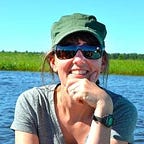Backstories: Takachar
Cyclotron Road’s fellows are creating the future of clean energy, advanced manufacturing, and electronics. In this new series, Backstories, we are tracing the decisions and inflection points that landed them here.
The word “recycling” was not in Kevin Kung’s childhood lexicon. He was born in Taipei in 1986, twenty years before waste streams were separated for recycling. But today, thanks to strict policies triggered by landfills nearing capacity, Taiwan’s capital has one of the best recycling rates in the world.
Kevin, part of Cyclotron Road’s Cohort Four, is now on a mission to turn a different kind of waste—residues from agriculture, such as post-harvest plant husks—into products, providing farmers with a new revenue stream. His startup Takachar is commercializing a mobile reactor that can turn waste biomass into fuels or chemicals. Takachar’s value proposition is that it enables farmers to convert their agricultural waste into revenue. Doing so will also reduce carbon emissions and improve air quality on farms where today these farm residues are simply burned.
What is your earliest professional aspiration?
Originally, I wanted to be an astronomer and then I became very interested in meteorology — I wanted to be the person who reports the weather. I decided to study physics because it’s very fundamental and with that you can do either of those. But then I got more interested in the biophysics side, so learning how to apply physics to biological systems, to bacteria, to human health. I thought, maybe there are ways we can understand biology better by using physics. That was the starting point of my research career, as I began pursuing my Ph.D.
I’ve come to realize that anything that has a spirit of exploration is really cool to me and makes me really happy. And this very spirit of exploration is what persists as I am building my venture.
Did you ever want to be an academic?
Yes, when I began my PhD I intended to become a professor.
What took you off that path?
I think it was the third year or so, when I entered the original phase of what later became Takachar. I was doing some work in Kenya with charcoal producers. I was amazed that charcoal is made from trees that are cut down [for that purpose]. It makes a lot of sense to make charcoal from agricultural residue instead and I got very excited about that idea. I don’t think it’s really a conscious choice to switch my career path. But to pursue this idea to completion, entrepreneurship seems to be the easiest route.
When you first came upon the issue of how charcoal was made, were you excited by the technical possibilities of making it from farm residue or was it the social and environmental implications that drove you?
What struck me is that when I interviewed those producers who cut down trees, [I learned that] they know very clearly that it is bad for the environment and not sustainable and they don’t like it either, but for them it’s their only livelihood. You have to remove the emotion and look at it objectively. I asked: If I really want to solve this problem how do I create additional livelihood in this context?
What do you think people really fundamentally misunderstand about waste?The term “waste recycling” might hurt more than help. The first [step] is reduce, and then it’s reuse, and then recycle — as the last resort. So, prior to recycling there are various things we do not normally associate with waste. Changing that point of view is a more fundamental shift. Recycling isn’t about waste but about creating resources and doing so economically. That’s the same story we are trying to tell with biomass.
Takachar strikes me a socially driven product, not a very lucrative one.
Biomass is by definition a low margin, high volume kind of commodity. Can you break even and, if so, how much can you make? But I think the fundamental thing is that for a company to survive and have impact, it still needs to have economic fundamentals work out.
You recently published a memoir—How to Drink from a Firehose: What MIT Taught Me about Innovation, Entrepreneurship,
and the Pursuit of Life—in your native Taiwan. What motivated you to write it and what does it focus on?
Sometimes I just have to pursue a project — perhaps more for myself than for others. And my memoir is one of these instances. My goal is to show readers what my MIT education was like — not all glory and prestige, but full of self-doubts, failures, and also unexpected personal growth. Long-term job stability and the ability to innovate and reinvent are on many people’s minds in Taiwan today, and my story addresses how MIT prepares students for a career in the 21st century. My publisher and I have thoroughly enjoyed the experience, and now we are also looking for U.S. publishers who may be interested in working with us to retell the story in English.
